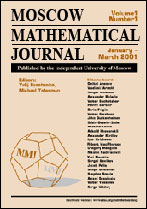|
This article is cited in 13 scientific papers (total in 13 papers)
Generalized Harish-Chandra modules
I. B. Penkova, V. V. Serganovab
a University of California, Riverside
b University of California, Berkeley
Abstract:
Let $\mathfrak g$ be a complex reductive Lie algebra and $\mathfrak h$ be a Cartan subalgebra of $\mathfrak g$. If $\mathfrak k$ is a subalgebra of $\mathfrak g$, we call a $\mathfrak g$-module $M$ a strict $(\mathfrak g\mathfrak k)$-module if $\mathfrak k$ coincides with the subalgebra of all elements of $\mathfrak g$ which act locally finitely on $M$. For an intermediate $\mathfrak k$, i.e., such that $\mathfrak h\subset\mathfrak k\subset\mathfrak g$, we construct irreducible strict $(\mathfrak g\mathfrak k)$-modules. The method of construction is based on the $\mathcal D$-module localization theorem of Beilinson and Bernstein. The existence of irreducible strict $(\mathfrak g\mathfrak k)$-modules has been known previously only for very special subalgebras $\mathfrak k$, for instance when $\mathfrak k$ is the (reductive) subalgebra of fixed points of an involution of $\mathfrak g$. In this latter case strict irreducible $(\mathfrak g\mathfrak k)$-modules are Harish-Chandra modules.
We also give separate necessary and sufficient conditions on k for the existence of an irreducible strict $(\mathfrak g\mathfrak k)$-module of finite type, i.e., an irreducible strict $(\mathfrak g\mathfrak k)$-module with finite $\mathfrak k$-multiplicities. In particular, under the assumptions that the intermediate subalgebra $\mathfrak k$ is reductive and $\mathfrak g$ has no simple components of types $B_n$ for $n>2$ or $F_4$, we prove a simple explicit criterion on k for the existence of an irreducible strict $(\mathfrak g\mathfrak k)$-module of finite type. It implies that, if g is simple of type $A$ or $C$, for every reductive intermediate $\mathfrak k$ there is an irreducible strict $(\mathfrak g\mathfrak k)$-module of finite type.
Key words and phrases:
Complex reducive Lie algebra, $(\mathfrak g\mathfrak k)$-module, Harish-Chandra module.
Received: March 24, 2002
Citation:
I. B. Penkov, V. V. Serganova, “Generalized Harish-Chandra modules”, Mosc. Math. J., 2:4 (2002), 753–767
Linking options:
https://www.mathnet.ru/eng/mmj71 https://www.mathnet.ru/eng/mmj/v2/i4/p753
|

| Statistics & downloads: |
| Abstract page: | 394 | | References: | 50 |
|




 Contact us:
Contact us: Terms of Use
Terms of Use
 Registration to the website
Registration to the website Logotypes
Logotypes








 Citation in format
Citation in format 
